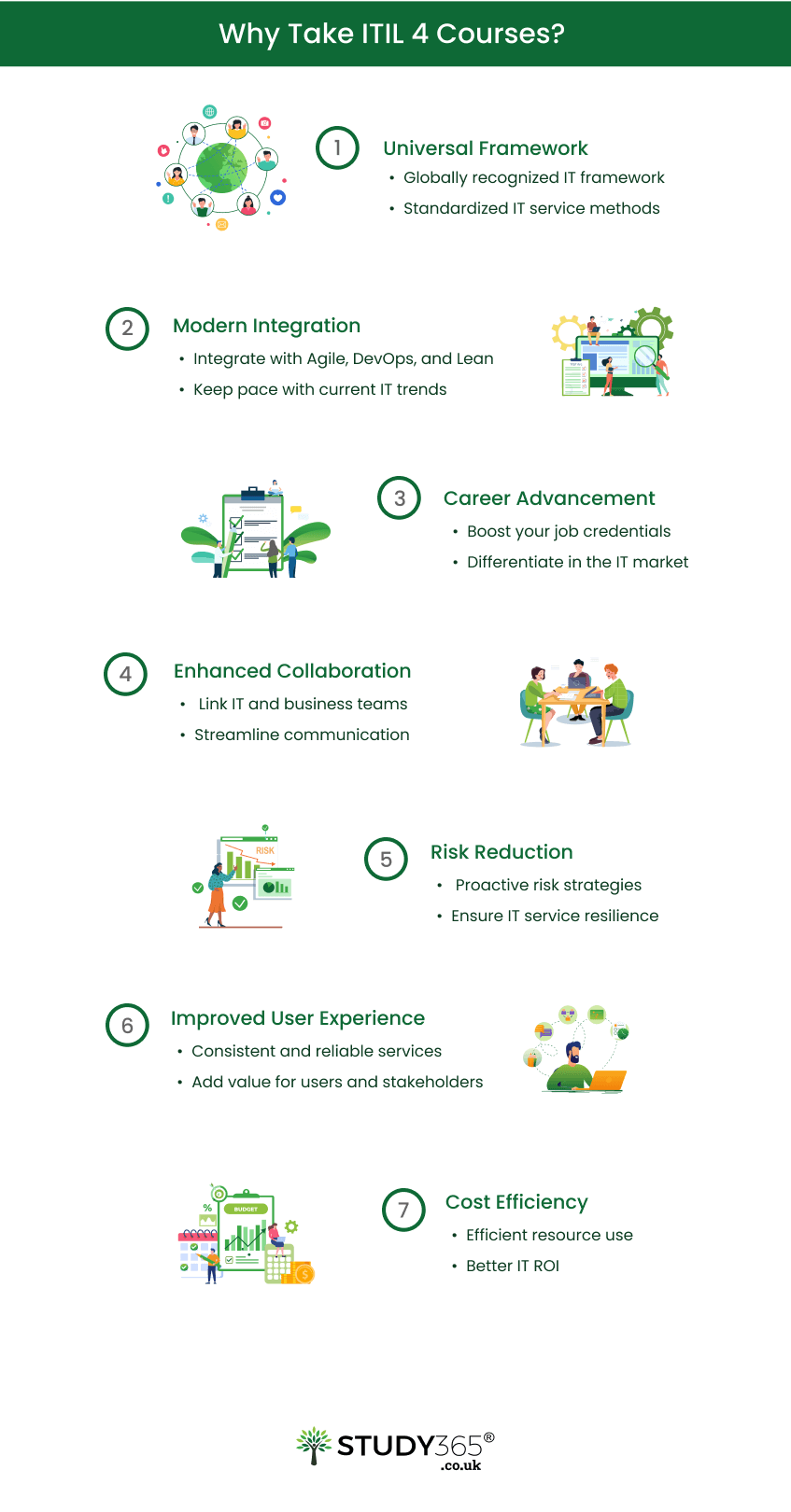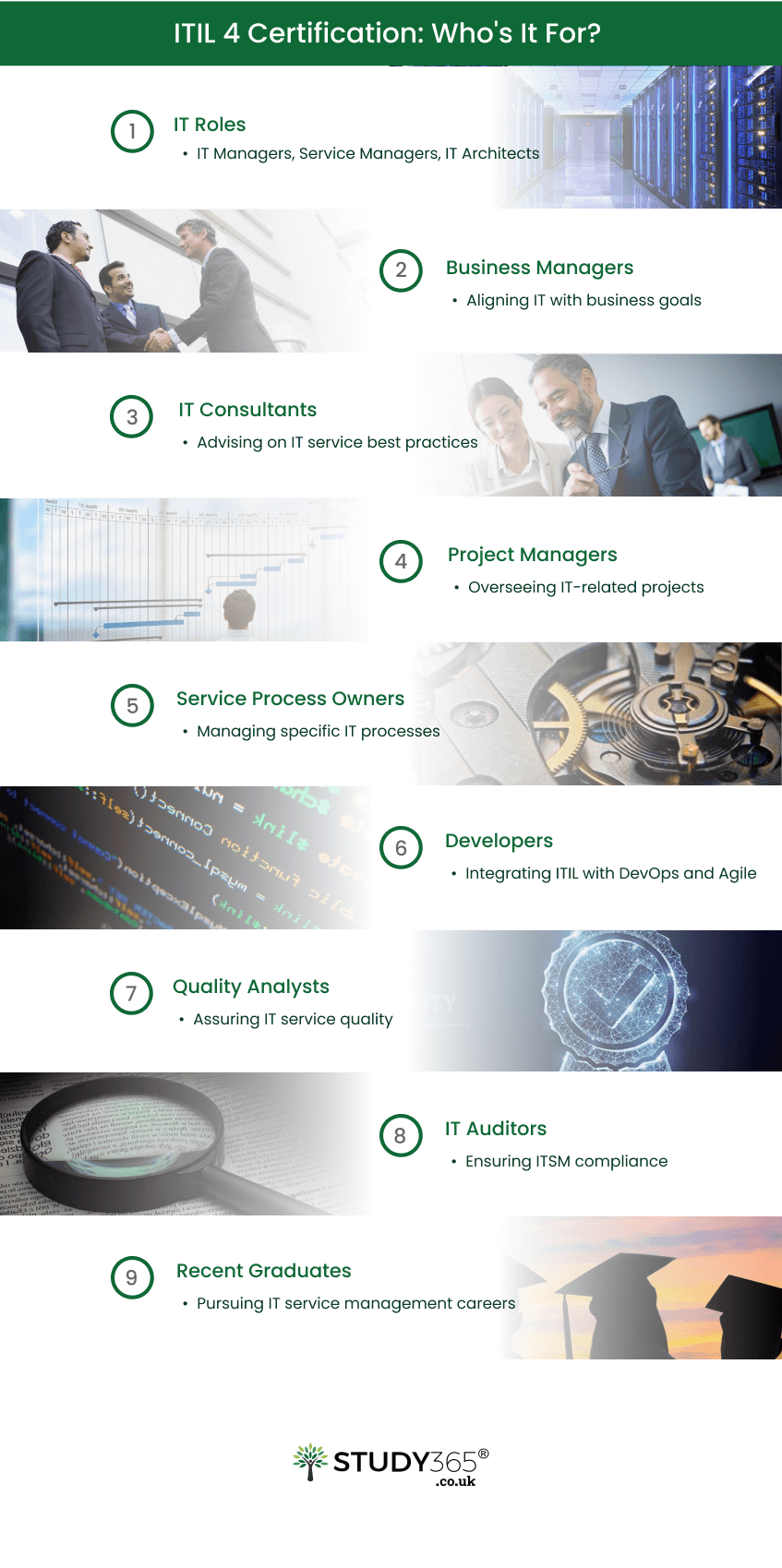How Important is ITIL® 4 certification in the UK in 2024

Have you ever wondered why ITIL Certification is this valuable in today’s fast spaced world? To run organisations smoothly and efficiently this has become a must. This blog talks about ITIL® 4 and why you should study it. Keep on reading to find out more.
Brief overview of ITIL® 4
ITIL® 4 has changed over time. Since its start in the 1980s, ITIL® 4 has gone through a number of changes and improvements. The first versions, which are often called ITIL v1 and v2, gave useful advice on IT service management. ITIL v3 was released in 2007. It took a more holistic approach.
ITIL v3 was changed to ITIL 2011 in 2011 to make some things clearer and better. It talked about how important IT services are to achieving business goals as a whole.
With the release of ITIL® 4, which came out in 2019, ITIL® 4 went through a big change. ITIL® 4 is a current update to ITSM that takes into account how important:
- Agile
- DevOps
- Digital transformations are becoming in IT
It introduces the Service Value System (SVS) and the Service Value Chain (SVC), which give organisations a more flexible and adaptable way to create value through IT services.
In 2024, ITIL® 4 will still be very important because organisations will still need IT services to run their processes and come up with new ideas. ITIL® 4's flexible framework is a good fit for the changing IT environment, which is dominated by:
- Cloud computing
- Cybersecurity
- Rapid technological progress
It helps organisations manage their IT processes, improve the quality of their services, and keep their focus on the customer.
- Acceptance around the world
- Standing in the United Kingdom and other places
- Europe
- North America
- Asia
- Other places
- Customer-centric approach
ITIL® 4 is widely used and accepted around the world in many businesses. Organisations all over the world have adopted its ideas and practises, making it the de facto standard for IT service management. ITIL® 4 is known all over the world because of its certification programmes. Professionals look for ITIL® 4 qualifications to improve their ITSM skills and job prospects.
ITIL® 4 has its roots in the Central Computer and Telecommunications Agency (CCTA), which is part of the government of the UK. Because of this, ITIL® 4 is widely used in the UK and has become a big part of the IT culture there. ITIL® 4 is popular and widely used in the UK, but it is also widely used in:
Its usefulness and applicability make it a valuable tool for organisations all over the world, no matter where they are.
The whole point of digital change is to improve the customer experience. ITIL, especially in its most recent form (ITIL® 4), puts a lot of emphasis on putting the customer first. It helps businesses come up with services that directly meet the wants of their customers. This makes sure that digital projects are in line with customer satisfaction.
5 Key stages
The ITIL® 4 service lifecycle is like a roadmap that helps organizations manage their IT services from start to finish. It has different stages, each with its own important tasks. (Source)
- Service Strategy
- Service Design
- Service Transition
- Service Operation
- Continual Service Improvement (CSI)

- In the "Strategy Management" stage, it's about figuring out the bigger picture for IT, like setting goals and budgets. It's like planning how much money you need for a big trip and making sure everything is ready.
- "Service Design" is where they work out the details, like what services they'll offer and how they'll do it. It's like designing a menu for a restaurant, deciding what dishes to serve, and how they should look and taste.
- "Transition Management" is when they make sure the changes they planned actually work. It's like when you redecorate your room and make sure all the new furniture fits and looks good.
- "Service Operation" is about making sure everything runs smoothly. It's like keeping your room tidy and organized, so you can find what you need easily.
- Finally, "Continual Service Improvement" is like always looking for ways to make things better. It's a bit like reviewing your homework to see how you can do even better next time. They use data and information to figure out what's working and what needs improvement.
What is a project?
Think of a project like creating a piece of art. It's a unique and temporary task with a clear beginning and end. Just like when you decide to make a painting or a sculpture:
- You plan how it will look
- Gather your materials
- Work on it until it's finished
Projects can be all sorts of things. It might be like:
- Painting a beautiful picture
- Building a treehouse in your backyard
- Even organizing a special party for a friend
These are all examples of projects. Project management methods like PRINCE2® and PMP help you organize and guide your work to make sure your "artwork" turns out just right.
Alignment with digital transformation trends
Service Orientation is a key principle of ITIL® 4. It means focusing on giving customers value through clear services. Businesses today are changing to focus more on services. They want to make customers happy and be flexible. ITIL® 4's service management practises work well with this trend. They help organisations:
- Design
- Deliver
- Improve
services that meet changing customer needs.
Automation and AI are important parts of digital change. ITIL ®4 knows that automation is important for IT service management. It gives guidelines for:
- Automating routine jobs
- Resolving incidents
- Managing problems
This can make service delivery more efficient and faster.
Cloud Computing: ITIL® 4 can help organisations run their cloud-based services well now that they are used by a lot of people. It gives advice on service:
- Strategy
- Design
- Change
So, businesses can make sure their cloud projects fit in with their IT service management strategy as a whole.
A common part of digital transformation is the use of DevOps and Agile methods. These methods make it easier to make and release software quickly.

Benefits of ITIL® 4 certification
Professional growth
A person's career can grow with an ITIL® 4 qualification. Because it gives a complete understanding of IT service management practises. It gives people access to better jobs and higher pay, which makes them more competitive in the job market. ITIL® 4 certification also connects people to a global group of professionals who:
- Share information
- Help each other find jobs
- Work together on projects
It encourages a mindset of learning all the time.
Operational excellence
ITIL practises are meant to improve operational excellence by:
- Optimising IT service management processes
- Cutting down on mistakes
- Lowering costs
They also support consistency in service quality by making sure that IT services meet or go above the standards that have already been set. Effective problem and incident management also contribute to operational success. This is by reducing disruptions and making services more stable.
Business alignment
- Strategic focus: ITIL® 4 is like a map that helps companies make sure that their IT services fit in with their general business goals.
- Risk management: Think of ITIL® 4 as a way for companies to plan for and deal with problems that could happen with their computer systems. It helps them figure out what could go wrong and how to fix it so it doesn't stop the company from doing its job.
- Customer-centric approach: ITIL® 4 reminds businesses to think about the workers and customers who use their computer services. It's like a hint to make sure these services are easy to use and helpful. People are happy when their computer material works well, which is good for the company.
With ITIL® 4, businesses that are flexible and able to change can be more. It lets them be ready to use new technology when they need to.
5 ITIL® 4 certification levels
ITIL® 4 Foundation
The ITIL Foundation certification is the first certification you can get. It gives you a basic understanding of the:
- Ideas
- Principles
- Terms
It is a great place to start for people who have never used ITIL® 4 before or who want to learn the basics of IT service management. For higher-level ITIL® 4 training, you need to pass the Foundation level first.
ITIL® 4 Practitioner
An ITIL® 4 Practitioner works on how to use ITIL® 4 ideas in the real world. It gives professionals the skills they need to put ITIL® 4 ideas to use in their own organisations. This certification is for people who want to move from the theoretical information they learned in the Foundation level to putting it into practise.
ITIL® 4 Intermediate
The main parts of ITIL® 4 Intermediate are:
- The Service Lifecycle
- The Service Capability
These two streams offer in-depth understanding and specialisation in different parts of IT service management. It is made up of a number of modules. Where candidates can choose the ones that match their job goals and the needs of their organisation. Intermediate badges show that you know more about ITIL processes and practises.
ITIL® 4 Expert
Getting ITIL® 4 Expert certification shows that you know a lot about IT service management. To get this certification, candidates must earn a certain amount of points at the:
- Foundation level
- Practitioner level
- Intermediate level
- Pass the Managing Across the Lifecycle (MALC) module.
ITIL® 4 Expert certification shows that you know everything there is to know about ITIL® 4 and can handle IT services well.
ITIL® 4 Master
ITIL® 4 Master is the highest level of ITIL® 4 certification. It shows that the person has the skills to use ITIL ideas in complicated, real-world situations. To become an ITIL Master, candidates must show that they know how to put ITIL principles into practise by:
- Writing a plan
- Going through an interview
This certification is for workers who have worked in IT service management for a long time and know a lot about ITIL.

Difference between 3 qualifications (Source)
PRINCE2® is a practical, process-based method that gives clear, step-by-step instructions on how to complete a project successfully. It is based on:
- Processes
- Steps
- Models
PMP is built on A Guide to the Project Management Body of Knowledge, (PMBOK® Guide) by the Project Management Institute. The PMBOK® Guide gives you the tools and skills you need to handle projects.
ITIL® 4 comes from the same people as PRINCE2®, so it makes sense that it is also based on processes. Its goal is to help you improve how IT is delivered and managed in a company. With ITIL, you can always improve:
- Efficiency
- Usefulness
- Quality
- Management of costs
ITIL® 4 has usually been used for IT, but more and more businesses are finding that it can be used in many different places and for many different reasons.
Without question,
IT professionals in the UK who have an ITIL® 4 certification have a lot to gain from it. Think of it as a useful tool you can use in your work. ITIL® 4 is kind of like a guidebook that teaches you how to manage IT services well. By getting ITIL® 4 -certified:
- You'll learn useful skills
- You'll be able to get better jobs
- Move up in the tech field
So, if you want to take your IT job to the next level, why wait? Take the first step towards ITIL® 4 certification today and put yourself on the road to success. Contact us at Study365 for further information.

FAQs
Related Products
>Leave a Message
Leave a Message
YOUR EMAIL ADDRESS WILL NOT BE PUBLISHED. REQUIRED FIELDS ARE MARKED.

